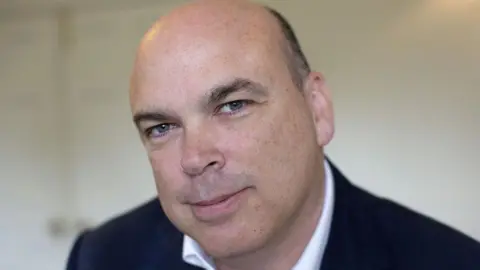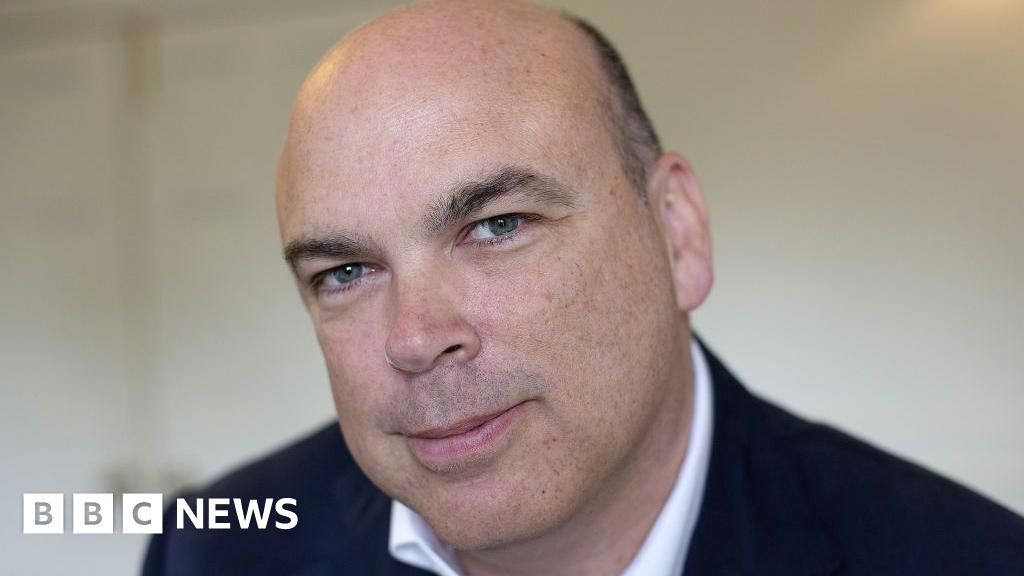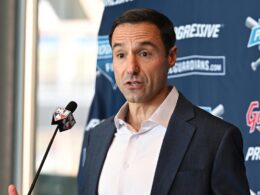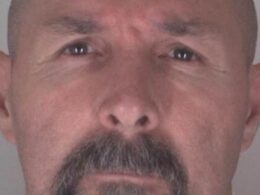Who is British tech tycoon Mike Lynch?
 Bloomberg/Getty Images
Bloomberg/Getty ImagesMike Lynch, a British tech entrepreneur, is missing after a luxury yacht sunk off the coast of the Italian island of Sicily.
After co-founding British tech firm Autonomy in 1996, and backing several successful tech firms, the businessman was regarded by some as the UK’s answer to Microsoft founder Bill Gates.
One person is dead and six are missing after a 56m superyacht called Bayesian, which has been linked to Mr Lynch’s family, sank following bad weather.
His wife, Angela Bacares, has been rescued.
The British tech tycoon made his riches by selling his company Autonomy to US computing giant Hewlett-Packard (HP) in 2011 for $11bn (£8.6bn).
But an intense legal battle following the high-profile acquisition loomed over Mr Lynch for over a decade.
He was acquitted in the US in June on multiple fraud charges, over which he had been facing two decades in jail.
In an interview on BBC Radio 4 in August, Mr Lynch said he believed he had only been able to prove his innocence in US court due to his wealth.
The sinking of the yacht came on the same day that Mr Lynch’s co-defendant in the fraud case, Stephen Chamberlain, was confirmed by his lawyer as having died after being hit by a car in Cambridgeshire on Saturday.
Cambridge and Autonomy
Born on 16 June 1965, Mr Lynch is the son of a nurse and a fireman, and was raised near Chelmsford in Essex.
He studied Natural Sciences at the University of Cambridge, where he earned a PhD in mathematical computing, and later undertook a research fellowship.
In 1991, Mr Lynch helped establish Cambridge Neurodynamics – a firm which specialised in using computer-based detection and recognition of fingerprints.
His tech firm Autonomy was created five years later, using a statistical method known as “Bayesian inference” at the core of its software.
The company’s fast-paced growth and success throughout the late 1990s and early 2000s saw Mr Lynch earn a number of awards and accolades.
In 2006 he was awarded an OBE in recognition of his service to UK enterprise.
He served on the board of the BBC as a non-executive director, and in 2011 was appointed to the government’s council for science and technology – advising then prime minister David Cameron on the risks and possibilities of AI development.
After Autonomy’s sale to HP in 2011 – from which Mr Lynch is believed to have netted £500m – he went on to establish tech investment firm Invoke Capital.
The venture capital fund invested in the creation of British cyber security company Darktrace in 2013.
Mr Lynch, a shareholder in the firm, held a seat on its board until earlier this year.
He and his wife have two daughters, and live at the Loudham Hall estate in Suffolk.
Sale to Hewlett-Packard
Autonomy became successful for its software’s ability to extract useful information from data such as phone calls, emails and video.
It would then use this data to do things like suggest answers to a call-centre operator or monitor TV channels for words or subjects.
Prior to its purchase by HP in 2011, Autonomy had headquarters in San Francisco and Cambridge.
But the price tag came under scrutiny following the sale and Autonomy’s value was written down by billions just a year later.
In 2018, US prosecutors brought charges against Mr Lynch – accusing him of artificially inflating the company’s value.
They said he had concealed the firm’s loss-making business reselling hardware, and also accused him of intimidating or paying off people who raised concerns.
Mr Lynch told BBC Radio 4 at the start of August that while convinced of his innocence throughout the lengthy trial, he felt he was only able to prove his this in US court due to his wealth.
“You shouldn’t need to have funds to protect yourself as a British citizen,” he said.
“The reason I’m sitting here, let’s be honest, is not only because I was innocent… but because I had enough money not to be swept away by a process that’s set up to sweep you away.”
He added that following the lengthy legal saga, he wanted “to get back to what I love doing, which is innovating”.








